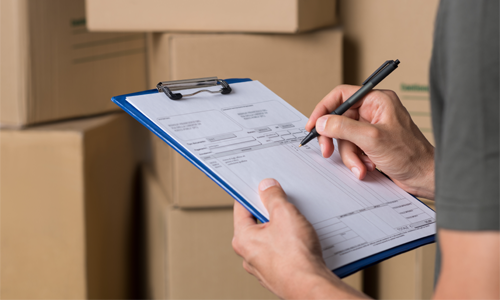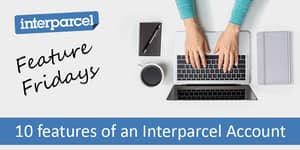Completing a commercial invoice is now an essential part of the process when sending a parcel to the EU, or the rest of the world. It's important that the parcel's information is filled out accurately, as this is all the customs authorities will use to determine the taxes and duties that may be applicable to the goods you are sending.
In most cases, taxes and duties won't be added your parcel. However, in the event that there are, it's imperative that there isn't any inaccurate or incomplete information on your customs form that may delay the delivery. Here we'll take you through the sections you'll encounter and impart from customs document advice to help you as you fill it in:
Describing your goods

An essential parcel shipping tip is to ensure you have included an accurate and sufficiently detailed description of your goods - that explains exactly what the goods are and who they are to be used by.
Giving a clear and accurate description enables the customs authorities to quickly (and correctly) apply any taxes and duties, and to check whether your goods are permitted to enter into their country.
The description needs to be specific, not vague. For example:
- Incorrect (vague) description = Book
- Correct (accurate) description = Young-adult non-fiction book
Keep in mind that there is a character limit, so make sure your descriptions are short but descriptive. Parcels that have vague descriptions of their contents can be stopped and held at customs, delaying deliveries while waiting for additional information to be supplied.
The more detailed and accurate the description, the less likely the parcel is to be delayed!
Selecting a tax status
Selecting a tax status is pretty straightforward - if you're a non-business shipper and the goods that you are sending are for private (not commercial) use, then you should select 'Private Individual' here.
If, however, you're sending commercially (for business) but aren't VAT registered, you should select 'Company - not VAT registered'. To be a non-VAT registered company this means that your taxable turnover is under £85,000.
If your taxable turnover goes above this amount, you will need to VAT register your company with HM Revenue and Customs (HMRC). After you've done this, when booking a delivery to the EU or the rest of the world, you should select 'Company - VAT Registered', you will then need to enter your VAT number (or EORI number) to speed up the customs process.
Giving a reason for export

Giving a reason for export is an important element on your customs invoice as it affects how much tax can be applied to your shipment depending on its destination.
- Gift: for any item being given by one private individual to another, which are in no way consigned to a business. It may also help to add 'gift' into your goods description for clarity.
- Sale: this simply means goods that have been sold.
- Sample: this describes items that have been sent free of charge that aren't suitable for sale and are to be used with the view of soliciting a future order.
- Repair: for this reason you may be sending goods for repair, or having repaired them you are now shipping them back to the customer. This may also be good to include in the goods description area.
- Return: this describes goods that have previously been shipped, that are now being returned to its original destination.
- Documents: used to describe any shipment or parcel that includes documents or paperwork of any kind.
- Personal Effects: this denotes any shipment containing personal items, most often baggage or household goods that individuals will have delivered when moving house.
IOSS numbers
Businesses who have opted in to IOSS to meet their VAT obligations will need to declare their unique IOSS number on their Customs invoice when booking with us.
IOSS is only for Business-to-Consumer (B2C) shipments for goods worth €150 (£135) or less.
The IOSS allows you to register with one of 27 EU tax authorities and to report and pay your EU VAT return in one monthly payment. Non-EU based business who do not have an establishment in the EU have to appoint an EU-established intermediary to fulfil their VAT obligations and benefit from the IOSS.
EORI numbers
Businesses that are sending parcels or shipments to the EU will need to supply their EORI (Economic Operator Registration and Identification Number) number at this stage. This is mandatory for both VAT and non-VAT registered businesses and is used by customs authorities to identify the company that is exporting or importing goods.
If you move goods between Northern Ireland and the Republic of Ireland, you won't have an EORI number. But, if you move goods between Northern Ireland and the UK, you will. This EORI number will begin with 'XI'.
For UK businesses, EORI numbers will begin with 'GB' and contain 12 digits. If you are a VAT registered company you may already have an EORI number, so check any related paperwork to find out.
Finding your HS code

HS (Harmonised System) codes are international product naming numbers that were developed by the WCO (World Customs Organisation) to speed up the customs clearance process.
This code is necessary for anyone (private individuals and businesses) sending goods to Europe, or the rest of the world, from the UK. It is made up of 6 digits, which are drawn from over 5000 commodity groups. Each of these groups have 99 chapters, each with 21 sections.
This can be an overwhelming amount of information to navigate when finding your HS code, so we've simplified the process and included a free 'HS Lookup Tool' within our booking form for our customers to use.
Within this tool we have pulled out some of the most common categories such as 'Shoes, Clothes & Accessories' so you can quickly click your way through the process. But, don't worry if your item isn't listed in a quick click button, you can easily access our keyword search and find your code in next to no time.
Understanding 'country of manufacture'
This part is also very important as the origin of your goods determines their economic nationality and so identifies them for lower, or no, duties. This doesn't describe where they have been shipped from or bought from, it applies to the actual origin of the materials themselves.
Part of this determining process is to allocate where the good's value was created and where it was subsequently processed.
For example, a car has many parts - bumpers, brakes, leather seats, rubber tyres, and so on. Each of these components were made in different countries and shipped to the UK to be assembled into the final product.
This can make it difficult to locate the goods' country of manufacture or origin, but typically, like in the case of a car, the final origin is determined by the 'last substantial transformation' location, which would be the UK.
There are three main categories which affect the country of manufacture:
- Change of tariff classification: when work is done within a country to change the tariff (HS) classification of the goods. For example, the rubber tyres of the car would have one HS code, but when the car is completed this would come under another, so would change the tariff and the origin.
- Sufficient value-added: this means that the final country of origin would need to contribute 50% value to the finished product to claim country of manufacture. Each component of the car adds value, but the value added through assembly would assign the product a UK origin.
- Specific processing: this refers to certain working or processing actions that, if taken, can qualify the final product to originate from that country. For example, sheet metal that originated from the EU, but was subsequently fashioned into car doors in the UK, would originate from the latter.
This section is very important, so make sure you understand the country of manufacture for every item that you ship.
Stating value

The value of your goods is essential to determine the duties and taxes that may apply. It is really important to state accurately how much your goods are worth. If this isn't accurately recorded on your customs invoice, or if you have purposefully undervalued your goods, you could be issued with a fine or have your goods seized.
Value can be determined by three factors:
- Commercial / retail value: this is the price an end buyer would pay to purchase a product. For businesses selling to customers, this will typically be the value you should state on your customs invoice.
- Wholesale value: this is the price for a single item that was bought in bulk, which would be the value declared on your customs form.
- Cost price: this is how much it costs to make the item. Often if customs aren't sold on the value of your goods, they will find the cost price and use this to calculate its value.
If customs need more information about the value of your goods, they may ask the buyer to provide documentation showing proof of sale. To avoid the delay this could cause, make sure to include the accurate value of your goods.
Make sure that you know how to fill out a customs invoice clearly, and accurately, when booking an EU or international shipment. It is essential in ensuring your parcel isn't unnecessarily delayed or that you aren't issued with a fine.
When you book a delivery with Interparcel all you need to do is fill out our easy to navigate form that will set your parcel up with exactly what it needs to glide through customs. Along with these commercial invoice tips, we've simplified the process so that sending to anywhere in the world is straightforward, keeping communities connected globally. Book a delivery today and send to the EU and beyond in just a few clicks!









 Facebook
Facebook Twitter
Twitter Instagram
Instagram Linked In
Linked In YouTube
YouTube